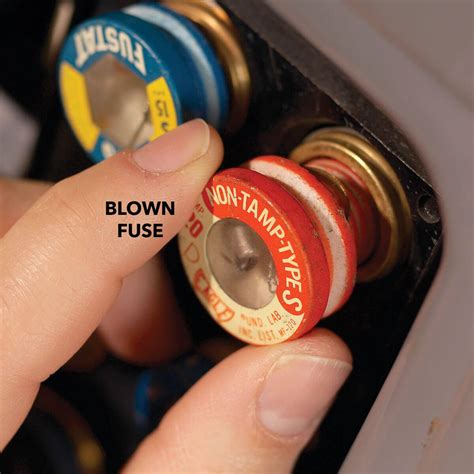electrical box blown up If your breaker won’t reset and is completely blown, our five-step fix won’t quite do the trick. A circuit breaker that won’t reset could mean you have a short circuit, a faulty breaker, or another serious problem on your hands. Since electric work of any kind can pose a threat to your safety and others, we strongly . See more Scientifically formulated with a highly-effective combination of ingredients, this EPA-registered fogger works to kill fleas, flea eggs, flea larvae and ticks, as well as cockroaches, lice, mites, bedbugs, ants and many other household pests.
0 · power fuse blown
1 · home fuse blown out
2 · fuse box blown out
3 · fuse blown in house
4 · electrical fuse blown
5 · electric fuse blown off
6 · blown fuse box repair
7 · blown fuse box location
In this guide, we will walk you through the basics of lighting junction box wiring, including the materials you will need, the steps involved, and important safety precautions to keep in mind.
If your breaker won’t reset and is completely blown, our five-step fix won’t quite do the trick. A circuit breaker that won’t reset could mean you have a short circuit, a faulty breaker, or another serious problem on your hands. Since electric work of any kind can pose a threat to your safety and others, we strongly . See moreSince most homes no longer have fuse boxes, a “blown fuse” has become synonymous with any problem with your circuit breaker. However, a literal fuse is a metal strip encased . See more
Sometimes simply flipping the switch won’t be enough, and calling a professional for further investigation or repairs will be necessary. Electricians in most areas generally charge . See more When there’s a blown fuse, you must go beyond simply resetting or troubleshooting the circuit breaker – instead, you’ll have to actually identify and replace the fuse. This could be an all-too-common problem: Faulty appliances, . Understanding the root causes and how to address them can prevent more serious electrical problems from occurring. This article provides a comprehensive guide on identifying . When a fuse blows, its ribbon burns, and all the lights, outlets, appliances, and fixtures powered by the circuit will lose power. There are two common causes of blown fuses: Overload: Too many lights or plug-in .
If your circuit breaker keeps tripping, it could be a sign of an electrical problem in your home, up to and including serious fire risks. While it’s not necessarily dangerous if your circuit breaker trips occasionally, if it .
Blown fuses can be caused by a variety of issues. Learn what causes blown fuses and how to fix them with helpful tips from the experts at Linc Electric.
Overloaded circuits are the most common cause of blown fuses. Connecting too many appliances or simultaneously turning on too many lights heats the extension cord, causing a house fuse box to blow. Faulty appliances with loose wiring .First: if you know what caused a fuse to blow, such as something you just plugged-in, or that bank of six electric heaters in the sitting room, turn off and un-plug those devices. With a flashlight if needed, let's go take a look in the fuse . Blowing a fuse or tripping a circuit breaker is a common issue, especially if you’re a multitasker. If you overload a circuit, your system will cut off the electrical flow to prevent your wires from overheating and causing circuit .
Resetting a circuit breaker in your circuit breaker box is a quick and easy fix. Follow these steps and safety precautions to get your electrical supply back up and running again. Before resetting a breaker, turn off any lights and appliances attached to it. When there’s a blown fuse, you must go beyond simply resetting or troubleshooting the circuit breaker – instead, you’ll have to actually identify and replace the fuse. This could be an all-too-common problem: Faulty appliances, short circuits, and overloaded circuits can all result in .
Blown fuses are a common occurrence. But how often do you actually think about what might have caused the fuse to blow, much less called an electrician to make sure everything’s OK? If you’re like most people, the answer to that is probably “Never.”
Understanding the root causes and how to address them can prevent more serious electrical problems from occurring. This article provides a comprehensive guide on identifying and fixing a blown circuit breaker, detailing the necessary tools, safety precautions, and . When a fuse blows, its ribbon burns, and all the lights, outlets, appliances, and fixtures powered by the circuit will lose power. There are two common causes of blown fuses: Overload: Too many lights or plug-in appliances drawing power from .
If your circuit breaker keeps tripping, it could be a sign of an electrical problem in your home, up to and including serious fire risks. While it’s not necessarily dangerous if your circuit breaker trips occasionally, if it happens frequently, it should be fixed right away.Blown fuses can be caused by a variety of issues. Learn what causes blown fuses and how to fix them with helpful tips from the experts at Linc Electric.
Overloaded circuits are the most common cause of blown fuses. Connecting too many appliances or simultaneously turning on too many lights heats the extension cord, causing a house fuse box to blow. Faulty appliances with loose wiring can also blow your fuses, leading you to search how to fix a blown fuse in a plug.First: if you know what caused a fuse to blow, such as something you just plugged-in, or that bank of six electric heaters in the sitting room, turn off and un-plug those devices. With a flashlight if needed, let's go take a look in the fuse box to find and replace the blown fuse.
power fuse blown
Blowing a fuse or tripping a circuit breaker is a common issue, especially if you’re a multitasker. If you overload a circuit, your system will cut off the electrical flow to prevent your wires from overheating and causing circuit damage or fire. Follow these steps to restore power and get all those appliances going again: Resetting a circuit breaker in your circuit breaker box is a quick and easy fix. Follow these steps and safety precautions to get your electrical supply back up and running again. Before resetting a breaker, turn off any lights and appliances attached to it. When there’s a blown fuse, you must go beyond simply resetting or troubleshooting the circuit breaker – instead, you’ll have to actually identify and replace the fuse. This could be an all-too-common problem: Faulty appliances, short circuits, and overloaded circuits can all result in . Blown fuses are a common occurrence. But how often do you actually think about what might have caused the fuse to blow, much less called an electrician to make sure everything’s OK? If you’re like most people, the answer to that is probably “Never.”
Understanding the root causes and how to address them can prevent more serious electrical problems from occurring. This article provides a comprehensive guide on identifying and fixing a blown circuit breaker, detailing the necessary tools, safety precautions, and . When a fuse blows, its ribbon burns, and all the lights, outlets, appliances, and fixtures powered by the circuit will lose power. There are two common causes of blown fuses: Overload: Too many lights or plug-in appliances drawing power from . If your circuit breaker keeps tripping, it could be a sign of an electrical problem in your home, up to and including serious fire risks. While it’s not necessarily dangerous if your circuit breaker trips occasionally, if it happens frequently, it should be fixed right away.Blown fuses can be caused by a variety of issues. Learn what causes blown fuses and how to fix them with helpful tips from the experts at Linc Electric.
Overloaded circuits are the most common cause of blown fuses. Connecting too many appliances or simultaneously turning on too many lights heats the extension cord, causing a house fuse box to blow. Faulty appliances with loose wiring can also blow your fuses, leading you to search how to fix a blown fuse in a plug.First: if you know what caused a fuse to blow, such as something you just plugged-in, or that bank of six electric heaters in the sitting room, turn off and un-plug those devices. With a flashlight if needed, let's go take a look in the fuse box to find and replace the blown fuse.

sheet metal plates
sheet metal positions

Surface finishing is an important aspect of CNC machined parts and can affect the functionality and aesthetics of the final product. It can change the appearance of a part, making it look more .
electrical box blown up|electrical fuse blown